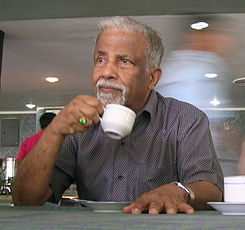E.C.G. Sudarshan
| George Sudarshan | |
|---|---|

E.C.G.Sudarshan at TIFR Mumbai in 2009
|
|
| Born |
16 September 1931 Pallam, Kottayam, India |
| Residence | United States, India |
| Nationality | India |
| Fields | Theoretical physics |
| Institutions |
University of Texas at Austin Indian Institute of Science Institute of Mathematical Sciences, Chennai Harvard University University of Rochester Tata Institute of Fundamental Research |
| Alma mater |
Madras Christian College University of Madras University of Rochester |
| Doctoral advisor | Robert Marshak |
| Doctoral students |
Mohammad Aslam Khan Khalil Narasimhaiengar Mukunda Anil Shaji |
| Known for |
Optical coherence Sudarshan-Glauber representation V-A theory Tachyon Quantum Zeno effect Open quantum system Spin-statistics theorem |
| Notable awards |
ICTP Dirac Medal (2010) Padma Vibhushan (2007) Majorana Prize (2006) TWAS Prize (1985) Bose Medal (1977) Padma Bhushan (1976) C V Raman Award (1970) |
Ennackal Chandy George Sudarshan (also known as E. C. G. Sudarshan; born 16 September 1931) is an Indian theoretical physicist and a professor at the University of Texas. Sudarshan has been credited with numerous contributions to the field of theoretical Physics including Optical coherence, Sudarshan-Glauber representation, V-A theory, Tachyons, Quantum Zeno effect, Open quantum system, Spin-statistics theorem, non-invariance groups, positive maps of density matrices, quantum computation among others. His contributions include also relations between east and west, philosophy and religion.
George Sudarshan was born in Pallam, Kottayam district, Kerala, India. Despite being raised in a Syrian Christian family, he later left the religion in large part due to marrying, Lalita, a Hindu and fellow student. They were married from 1954 to 1990 and have three sons, Alexander, Arvind (deceased) and Ashok. He considers himself a "Vedantin". He mentions disagreements with the Church's view on God and lack of spiritual experience as reasons why he left the Church.
He studied at CMS College Kottayam, and graduated with honors from the Madras Christian College in 1951. He obtained his master's degree at the University of Madras in 1952. He moved to Tata Institute of Fundamental Research (TIFR) and worked there for a brief period with Homi Bhabha as well as others. Subsequently, he moved to University of Rochester in New York to work under Robert Marshak as a graduate student. In 1958, he received his Ph.D. degree from the University of Rochester. At this point he moved to Harvard University to join Julian Schwinger as a postdoctoral fellow.
...
Wikipedia
